- Home
- Deborah Harkness
Time's Convert Page 34
Time's Convert Read online
Page 34
Philippe was watching his wife closely.
“You must do it soon,” Ysabeau continued. “And when you return, you can share your news of Matthew. Philippe and I would like that. Very much.”
“I would like that, too, madame.” Perhaps he and Ysabeau could organize a trade—a piece of information about Matthew and what was happening in the colonies in exchange for some intelligence on vampire customs and de Clermont history.
A family tree would be useful, for a start.
26
Babel
OCTOBER 1789–JANUARY 1790
Veronique tossed her white cap, festooned with the red, white, and blue ribbons of revolution, onto the table next to the bed. She flung herself onto the rumpled sheets, nearly upsetting the pot of coffee that was perched on a stack of books. Flushed with victory and triumph, she shared her news.
“The march on Versailles was a success. Thousands of women were there. King Louis and his brood are all in Paris now,” she said. “Marat is a genius.”
Marcus looked over his copy of L’ami du peuple. “Marat is a daemon.”
“That, too.” Veronique trailed a finger along the outline of Marcus’s leg. “It’s only right that creatures should have a voice. Even your Lafayette believes that.”
“You know that’s against the covenant.” Marcus put the newspaper aside. “My grandfather says—”
“I don’t want to talk about your family.” Veronique propped herself up on one shoulder. Her shift slid, exposing the soft curve of her breast.
Marcus moved the coffee and the books. His blood rallied at Veronique’s scent, that heady mixture of wine and woman that he could not seem to get enough of.
Veronique rolled over onto the scattered pages of Marat’s latest edition. Marcus lifted the hem of her shift, exposing shapely legs. Veronique sighed, her body opening to his touch.
“Lafayette brought the guards with him, though he waited long enough to do it,” she said as Marcus teased her breast with his mouth.
Marcus’s head lifted an inch. “I don’t want to talk about the marquis.”
“That will make a nice change,” Veronique replied, arching her body toward him with a giggle.
“Vixen,” Marcus said.
Veronique nipped him on the shoulder with sharp teeth, drawing beads of blood. Marcus pinned her to the bed with his body, entering her in a single thrust that brought a cry of pleasure. Marcus moved within her, slowly, deliberately, incrementally.
Veronique bared her teeth, ready to bite again. Marcus pressed soft lips to her throat.
“You’re always telling me to be gentle,” Marcus said, teasing her flesh with his teeth and tongue. Veronique was far more experienced than Marcus, and happy to guide him as he explored her body and discovered the best ways to please her.
“Not today,” she said, pressing his mouth closer. “Today, I want to be overthrown. Like the Bastille. Like the king and his ministers. Like—”
Marcus stopped her from sharing any more revolutionary sentiments with a fierce kiss and applied himself to meeting her every desire.
* * *
—
IT WAS ALREADY DARK OUTSIDE when Marcus and Veronique emerged from their attic on the left bank of the Seine. Veronique’s red, curling hair tumbled freely about her shoulders, the patriotic ribbons on her white cap fluttering in the breeze. Her striped skirts were hitched up at the side, showing plain petticoats and a hint of ankle along with sturdy clogs that protected her feet from both the hard cobblestones and the deep Parisian muck. She was buttoning her blue coat under her breasts, which accentuated her curves in ways that had Marcus longing to return to the bedroom.
Veronique, however, was intent on getting to work. She owned a tavern, one that Marcus still frequented along with his friend and fellow physician Jean-Paul Marat. There, Marcus and Marat talked about politics and philosophy while Veronique served up wine, beer, and ale to the students of the nearby university. She had been doing so for centuries.
Veronique was that rarest of all creatures: a family-less vampire. Her maker had been a formidable woman named Ombeline who had struck out on her own when the family she was serving didn’t return from their crusade to the Holy Land. Ombeline made Veronique a vampire a century later during the chaos of the first plague epidemic in 1348, plucking her out of an infected hostelry near the Sacré Coeur. Paris’s vampire clans had seen the opportunity the disease presented to dramatically increase their numbers; humans desperate to survive were quick to take any hope of survival that was offered.
Ombeline had met her end in August 1572 when she was killed by a rampaging Catholic mob who mistook her for a Protestant during the melee that erupted when Paris celebrated the marriage of Princess Margaret to Henry of Navarre. Veronique was not, as a result, a great believer in religion. It was something she and Marat had in common.
Though many of the city’s vampire clans had attempted to fold Veronique into their ranks—first by persuasion, then by coercion—she had resisted all efforts at subjugation. Veronique was content with her tavern, her attic apartments high above the street, her loyal clientele, and her enjoyment of life itself, which, even after more than four centuries, still seemed precious and miraculous to her.
“Let’s stay in tonight,” Marcus said, catching her hand in his and pulling her back toward the door.
“Insatiable fledgling.” Veronique kissed him deeply. “I must make sure that all is well at work. I am not a de Clermont, and cannot stay abed all day.”
Marcus could not think of a single member of his family that did so, but had learned to steer conversation away from the sore subject of aristocratic privilege.
Sadly, it was the only topic of conversation in Paris, so it dogged them in overheard snatches all the way to the rue des Cordeliers, where the slump of Veronique’s tavern awaited them, its roofline bent with age and the windows listing this way and that. Light streamed out onto the street in sharp angles, refracted by the panes of glass as though they were involved in one of Dr. Franklin’s optical experiments. An ancient metal sign creaked on its pole overhead. The cutout shape of a beehive gave the place its name, La Ruche.
Inside, the conversation was deafening. Veronique’s arrival was greeted with cheers. These turned into catcalls when Marcus appeared behind her.
“Late to work, citizen?” her patrons teased. “Up at the crowing of the cock, Veronique?”
“What’s wrong with you, boy?” someone called out of the smoky gloom. “Why not keep her in bed, where she belongs?”
Veronique sailed through the room bestowing kisses on the cheeks of her favorites and accepting congratulations on the successful march on Versailles that she had helped to organize.
“Liberty!” a woman called from the counter where drinks were served.
“Fraternity!” the man next to her chimed in. This earned him a good-natured shove from his neighbor, which sent his coffee sloshing over the brim of the cup. Veronique served every kind of liquid refreshment a creature could desire—wine, coffee, tea, ale, chocolate, and even blood. The one thing she refused to serve was water.
Her customers began to bang their drinking vessels—dented tin and heavier pewter, fine glass and glowing copper, rough pottery and delicate porcelain—on tables, windowsills, the counter, walls, the backs of chairs, stools, and even on the skulls of nearby patrons.
Marcus grinned. He was not the only one drawn to Veronique’s fire and passion.
“Equality!” Veronique cried, holding her fist in the air.
Marcus watched the crowd swallow her up, everyone eager to hear what she had seen at the palace, and how the royal family had responded, and whether it was true that Veronique spoke to the queen.
Marcus no longer panicked when his skin prickled and his hackles rose to alert him that that there was another predator nearby. He had been a vampire
for eight years and was now a fledgling, capable of feeding himself and moving like a warmblood. The sleepless hours no longer weighed on him. He spoke French like a native, could converse with his grandfather and Ysabeau in Greek, and debated philosophy with his father in Latin.
“Hello, Matthew.” Tonight, however, Marcus spoke in English, a language that he and his father shared but that was beyond the reach of the ordinary Parisians who filled La Ruche. He turned.
Matthew was sitting in a dark corner, as usual, sipping wine out of Veronique’s finest glass. His waistcoat was the color of soot and embroidered with paler gray and silver thread. The plain white shirt he wore underneath was immaculate, as were the silk hose that extended from knee to polished shoes. Marcus wondered how much the ensemble had cost, and reckoned it would be enough to feed a family of eight for a year or more in this part of town.
“You’re overdressed,” Marcus said mildly, approaching his father’s bench. “You should have donned your leather apron and brought a hammer and chisel if you wanted to blend in.”
The man next to Matthew turned, revealing a face that was strangely twisted, the angles of cheek and mouth set in a fleshy imitation of the tavern’s windows. Dark, deeply set eyes studied Marcus from under a thatch of black hair. Like Marcus, he wore no wig and his clothes were simple and made of thick, serviceable fabric.
“Jean-Paul!” Marcus was surprised to see Marat sharing a drink with his father. He wasn’t aware they knew each other.
“Marcus.” Marat moved along the bench, making room for him. “We are talking about death. Do you know Dr. Guillotin?”
The doctor inclined his head. He was dressed in somber black, though the material was expensive and the coat well cut. Guillotin’s dark eyebrows and the shadow at his jawline suggested there was dark hair under his powdered wig.
“Only by reputation.” Marcus wished he had ordered a drink first. “Dr. Franklin always spoke highly of you, sir.”
Guillotin extended his hand to Marcus. Marat eyed them both suspiciously and then buried his nose in his tin cup.
Marcus took the doctor’s hand and felt the shifting pressure in his grip that confirmed what Marat suspected: Guillotin was a Freemason, like Marcus. Like Matthew. Like Franklin. That meant that Guillotin knew about creatures, and about vampires in particular.
“Marcus often assisted Dr. Franklin in his laboratory,” Matthew said. “He is a surgeon, and interested in medical matters.”
“Like father, like son,” Guillotin said. “And you are a physician, too, Dr. Marat. How fortunate that I came upon my old friend the chevalier.”
No one came upon Matthew de Clermont by chance. Marcus wondered what constellation of influences had placed Matthew in Guillotin’s path.
“The doctor is trying to reform medicine.” Marat’s voice echoed strangely in his contorted nasal cavities. “He has picked the oddest place to begin. Dr. Guillotin wants to give criminals a quicker, more humane death.”
Marcus parted the tails of his coat and sat on the bench. God, he needed a drink. The pleasant hours he’d had with Veronique faded into memory as he prepared to navigate the tricky waters of this conversation.
“Perhaps, Doctor, we could get rid of death altogether. The chevalier de Clermont could make us all immortal, if he wanted.” Marat, who was a daemon and should know better than to bait Matthew, pressed the matter further. “But true equality wouldn’t suit the vampires. Who would be their serviteurs de sang?”
“Oh, I think we would always keep a few daemons around—for amusement if not nourishment,” Matthew said quietly. “Like the fools and jesters of old.”
Marat flushed. He was sensitive about both his small stature and his appearance. Marat’s fingers scratched at his neck, where a rash bloomed red and pink.
“I oppose capital punishment, as you know, Monsieur Marat,” Guillotin said. “But if we must put criminals to death, let it be quick and painless. And let it be done in a regular, reliable fashion.”
“I’m not sure God means death to be painless,” Marcus said. He searched the room for someone who might bring him a drink. Veronique caught his eye, and her mouth dropped open in astonishment at the company he was keeping.
“Improvements need to be made to these mechanical executioners,” Guillotin continued, as if Marcus had not spoken. His real audience was Matthew, who was listening attentively. “They have engines of death in England and Scotland, but the axes are crude and crush the spine and tear the head from the body.”
Marat’s fingers dug deeper into his skin, vainly searching for relief from the itching. Matthew’s nostrils flared as blood rushed to the surface, and Marcus watched as his father pushed back the appetites that plagued all vampires. The chevalier de Clermont was famously self-controlled. Marcus envied him that. Even though Marat was his friend, and a daemon, the metallic tang of his blood still made Marcus’s mouth water.
“I need to speak to you.” Matthew was suddenly next to him, his lips close to Marcus’s ear.
Reluctantly, Marcus left Marat and Guillotin. It was not the conversation that made him want to stay, but the prospect of slaking his sudden thirst. Matthew led him to the stained wooden counter, where Veronique was watering down blood with wine. She handed a tall beaker to Marcus.
“Drink,” she said, looking worried. Marcus was still too young to be fully trustworthy in a crowd of warmbloods.
Matthew waited until Marcus had swallowed down half the liquid before he spoke.
“I think you should stay away from Marat. He’s trouble,” Matthew advised.
“Then so am I, for we share the same views,” Marcus retorted, his temper flaring. “You can order me around, make me study the law, restrict my funds, and forbid me from holding a job, but you cannot choose my friends.”
“If you persist, you’ll be summoned to an audience with Philippe.” Once again, Matthew had switched to English. It was a common de Clermont practice, moving from one language to another in an attempt to speak more privately.
“Grandfather doesn’t care what I do.” Marcus took another sip. “He has bigger fish to catch than Jean-Paul or me.”
“There is no such thing as a small fish during a revolution,” Matthew replied. “Any creature who causes a ripple, no matter how seemingly insignificant, can change the course of events. You know that, Marcus.”
Maybe, but Marcus had no intention of conceding to his father’s demands. This city was his home now. Marcus felt comfortable among the working poor of Paris in a way he never did perched on a silk-covered chair in Ysabeau’s salon or attending an aristocratic ball with Fanny.
“Go back to the Île de la Cité where you belong,” Marcus told Matthew. “I’m sure Juliette is waiting for you.”
He did not like Matthew’s companion, whose soft, generous mouth said one thing and whose hard, dangerous eyes said something else.
Matthew’s eyes narrowed. Marcus felt a sense of satisfaction that his shot had reached its target.
“I can take care of myself,” Marcus insisted, turning his attention back to his drink.
“That’s what we all thought—once,” Matthew said softly. He slid a sealed letter across the counter. Embedded in the red-and-black marbled wax was an ancient coin. “You can’t say I didn’t try. I hope you enjoyed your liberty, equality, and brotherhood, Marcus. In the de Clermont family, it never lasts for very long.”
* * *
—
MARCUS WAS IN THE BACK room of La Ruche, dabbing at his wounds, wearing torn and filthy clothing. It was a frigid day in late January, and he had spent most of it running for his life.
“Have you forgotten what this means?” Philippe tossed the worn, ancient coin in the air and caught it as it dropped.
Marcus shook his head. The coin was a summons. He knew that. Every de Clermont knew that. Answer it, or face the consequences. Before, Marcus h
ad always obeyed his grandfather’s commands. Now he was going to find out what happened when you ignored them for months.
“We are winning, Grandfather. We’ve taken over the old convent,” Marcus replied, hoping a diversionary tactic would work.
Philippe was a battle-hardened general, however, and unlikely to be impressed by something so minor as the conquest of a moldering old religious building in a seedy part of Paris. He wrapped one hand around Marcus’s neck, while the other still held the coin.
“Where is Marat?” Philippe demanded.
“I’m surprised you don’t already know.” Even now, Marcus couldn’t resist baiting his grandfather, even though he was stronger, older, quicker, and could flatten him in a moment.
“Then he is probably in the first place they will look for him.” Philippe swore. “The attic above Monsieur Boulanger’s bakery, where you and Veronique have lodgings.”
Marcus gulped. Philippe was correct, as usual.
“I am disappointed in you, Marcus. I would have credited you with more imagination.” Philippe turned and stalked out.
“Where are you going?” Marcus asked, hurrying after him.
Philippe didn’t reply.
“I’ll get Marat out of Paris—into the countryside,” Marcus assured his grandfather, struggling to keep up while remaining within the normal parameters of human locomotion. Philippe’s legs were longer than Marcus’s, however, which made this difficult.
Philippe still paid him no notice.
The assault of sound that met them on the rue de Cordeliers hit Marcus like a blow. Even though it was winter, the streets were filled with vendors and market stalls. Gulls cried overhead before they swooped down to search for food. People called out to one another, advertising what they had for sale, the latest news and gossip, and the price of their wares.
“I swear, Philippe. On my honor,” Marcus said, hurrying along in his grandfather’s wake.

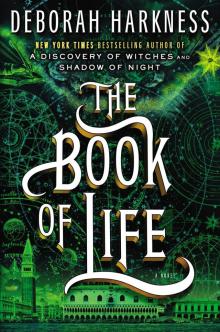 The Book of Life
The Book of Life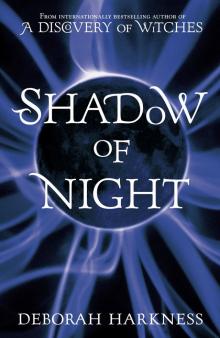 Shadow of Night
Shadow of Night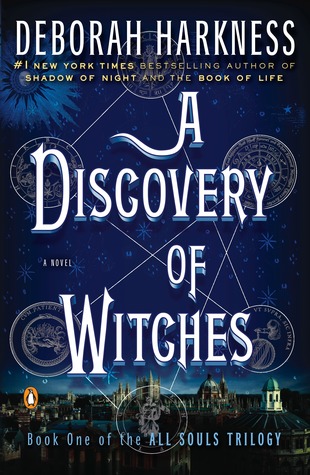 A Discovery of Witches
A Discovery of Witches The All Souls Real-Time Reading Companion
The All Souls Real-Time Reading Companion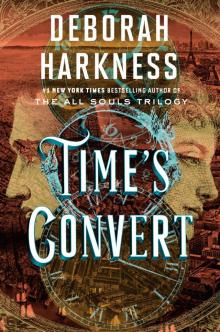 Time's Convert
Time's Convert The World of All Souls
The World of All Souls A Discovery of Witches: A Novel (All Souls Trilogy)
A Discovery of Witches: A Novel (All Souls Trilogy)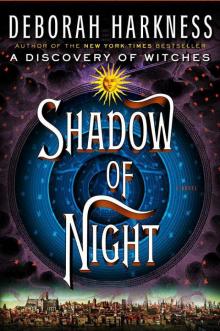 Shadow of Night: A Novel
Shadow of Night: A Novel